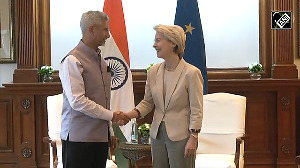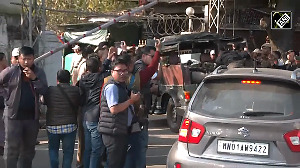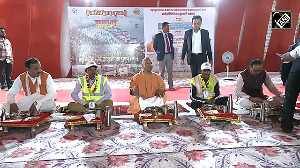The first soccer match between Portugal and England was distinctly memorable even if no one involved in Thursday's Euro 2004 quarter-final clash was around to remember it.
England thrashed Portugal 10-0 in a momentous match in Lisbon in 1947 -- one year before the coaches of either team, Luis Felipe Scolari and Sven-Goran Eriksson, were born.
The match was billed as a friendly but the visitors were clearly anything but, handing Portugal what remains their worst defeat and, by the same token, one of England's greatest triumphs.
England's victorious team were labelled the "Lions of Lisbon" on their return home. The current squad chose to follow as closely as possible in their footsteps, setting up their Euro 2004 training camp at the National Stadium in Jamor where the game took place on May 25, 1947. It was an era remote from today's game with players performing in baggy shorts and kicking a ball with a lace in it.
The result makes it look like a mismatch from a distance of 57 years but it did not seem so at the time.
The England team had lost 1-0 the week before in Zurich to Switzerland, who in turn had drawn with Portugal only a fortnight before that.
Portugal boasted three of Sporting Lisbon's so-called "Five Violins", a feared forward line which propelled the club to seven titles in eight years between 1947 and 1954.
But Jesus Correia, Fernando Peyroteo and Jose Travacos barely got a sight of goal that day and England keeper Frank Swift had as easy a time as he ever had for his national team.
For England, the match was really about four men -- forwards Stan Mortenson and Tommy Lawton, who scored four goals each, and wingers Stanley Matthews and Tom Finney who scored the other two.
It was the first time Matthews and Finney had appeared in an England shirt together.
Matthews, who went on to play domestic soccer into his 50s and who was the first European Player of the Year, had gone through a crisis.
The "Wizard of Dribble" had been off-form, losing his place on the right wing of the England team to Finney and even being dropped by his club Stoke City.
Matthews, already 32, left his home town club during the season on a high-profile transfer to Blackpool where he linked up with Mortenson in an enduringly successful partnership.
England had taken on a manager for the first time the previous year but, unlike Eriksson, Walter Winterbottom was not allowed to select the team himself. A selection panel did that job for him.
The panel's decision to bring back Matthews and switch Finney to the left wing proved a master stroke as the two wingers ran riot and provided all the bullets for Mortenson and Lawton, a battering ram of a centre-forward, to fire.
The Portuguese had a torrid time. Goalkeeper Joao Azevedo was substituted by Manuel Capela, who had made his debut only earlier the same month against the Swiss.
Right back and captain Alvaro Cardoso, who was skinned by Finney, was playing his unlucky 13th game for Portugal. He was substituted too and never played again for the national side.
Teams:
Portugal: Joao Azevedo (Sporting) (sub Manuel Capela (Belenenses)), Alvaro Cardoso (Sporting) (sub Vasco de Oliveira (Belenenses)), Francisco Ferreira (Benfica), Mariano Amaro (Belenenses), Antonio Feliciano (Belenenses), Francisco Moreira (Benfica), Jesus Correia (Sporting), Antonio Araujo (Porto), Fernando Peyroteo (Sporting), Jose Travacos (Sporting), Rogerio de Carvalho (Benfica).
England: Frank Swift (Manchester City), Laurie Scott (Arsenal), George Hardwick (Middlesbrough), Billy Wright (Wolves), Neil Franklin (Stoke City), Eddie Lowe (Aston Villa), Stanley Matthews (Blackpool), Stan Mortenson (Blackpool), Tommy Lawton (Chelsea), Wilf Mannion (Middlesbrough), Tom Finney (Preston North End).







 © 2025
© 2025